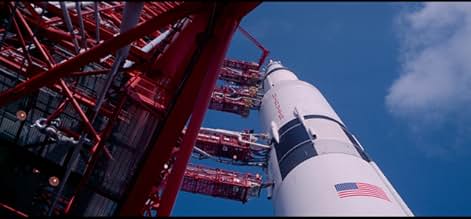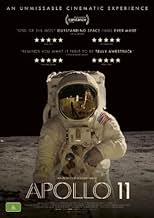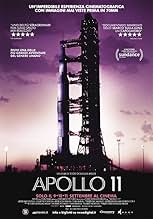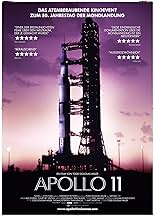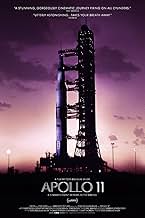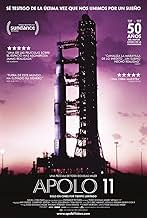Apollo 11
- 2019
- Tous publics
- 1h 33min
NOTE IMDb
8,1/10
28 k
MA NOTE
La mission Apollo 11 d'atterrissage sur la lune menée par le commandant Neil Armstrong ainsi que les pilotes Buzz Aldrin et Michael Collins.La mission Apollo 11 d'atterrissage sur la lune menée par le commandant Neil Armstrong ainsi que les pilotes Buzz Aldrin et Michael Collins.La mission Apollo 11 d'atterrissage sur la lune menée par le commandant Neil Armstrong ainsi que les pilotes Buzz Aldrin et Michael Collins.
- Récompensé par 3 Primetime Emmys
- 59 victoires et 44 nominations au total
Neil Armstrong
- Self - Mission Commander
- (images d'archives)
Mike Collins
- Self - Command Module Pilot
- (images d'archives)
Buzz Aldrin
- Self - Lunar Module Pilot
- (images d'archives)
- (as Edwin 'Buzz' Aldrin)
Deke Slayton
- Self - Director of Flight Crew Operations
- (images d'archives)
Clifford E. Charlesworth
- Self - Flight Director Green Team
- (images d'archives)
Bruce McCandless II
- Self - Capsule Commuicator (CAPCOM) Green Team
- (images d'archives)
- (as Bruce McCandless)
Charles Duke
- Self - Capsule Communicator (CAPCOM) White Team
- (images d'archives)
Gene Kranz
- Self - Flight Director White Team
- (images d'archives)
Jim Lovell
- Self - Backup Commander
- (images d'archives)
John F. Kennedy
- Self - President of the United States of America
- (images d'archives)
Janet Armstrong
- Self
- (images d'archives)
Patricia Mary Finnegan
- Self
- (images d'archives)
Andy Aldrin
- Self
- (images d'archives)
Joan Ann Archer
- Self
- (images d'archives)
- (non crédité)
Walter Cronkite
- Self
- (images d'archives)
- (non crédité)
Lyndon B. Johnson
- Self
- (images d'archives)
- (non crédité)
Avis à la une
Saw the Apollo 11 IMAX film last night. Highly recommend. No narration just the NASA announcer, communications between ship and ground plus a few other bits added such as Walter and JFK now and then. Images are amazing, esp in IMAX. It moves well, no slow moments, no soap opera, no agenda, lots of unseen footage and some new stories, pure documentary, the trip is the whole story. PDI is great, TLI is great, LM separation, footage of the crowd is great. Go see, you wont be disappointed. 90 minutes long.
The film starts the morning of launch day July 16, 1969. There are no actors, no reenactments, no narrator. It is 100% restored archival footage and recorded audio, most of which I had never seen before. Opening footage of the crowds gathering around Kennedy Space Center gave you the sense it was apparent to everyone the magnitude of what was about to happen.
They had audio and video of (an issue I won't spoil, something during launch prep I had never heard of before). Obviously there is no external footage of the spacecraft from the time it leaves earth orbit until it arrived at the moon but the editing and coverage used are excellent and you never feel like you're in the dark or missing out.
There is no attempt made at politicizing the event or manipulating the viewer, it is raw, factual cinéma vérité. Although I did find Kennedy's speech moving, they made the excellent choice to NOT show the famous portion we've all heard about landing a man on the moon and returning him safely by the end of the decade. It was the rest of that speech, which I'm not sure I'd ever heard, that was astute, prophetic and even funny at one point.
My one very minor caution is that viewers who aren't already aware how critical/dangerous some maneuvers were could miss out on the gravity of the situation. The filmmakers do assist with this with the score, which is absolutely fantastic (and according to the credits, composed entirely with instruments available in July '69), and some minor on-screen graphics (e.g. FUEL 30 seconds, 1202 alarm). It's a trivial concern but viewers who are familiar with the space program in general, and this mission in particular, will get the most out of the experience.
The film wraps up after our astronauts are safely home and cleared from quarantine. During the credits there are a few more interesting shots of some of the celebrations.
They had audio and video of (an issue I won't spoil, something during launch prep I had never heard of before). Obviously there is no external footage of the spacecraft from the time it leaves earth orbit until it arrived at the moon but the editing and coverage used are excellent and you never feel like you're in the dark or missing out.
There is no attempt made at politicizing the event or manipulating the viewer, it is raw, factual cinéma vérité. Although I did find Kennedy's speech moving, they made the excellent choice to NOT show the famous portion we've all heard about landing a man on the moon and returning him safely by the end of the decade. It was the rest of that speech, which I'm not sure I'd ever heard, that was astute, prophetic and even funny at one point.
My one very minor caution is that viewers who aren't already aware how critical/dangerous some maneuvers were could miss out on the gravity of the situation. The filmmakers do assist with this with the score, which is absolutely fantastic (and according to the credits, composed entirely with instruments available in July '69), and some minor on-screen graphics (e.g. FUEL 30 seconds, 1202 alarm). It's a trivial concern but viewers who are familiar with the space program in general, and this mission in particular, will get the most out of the experience.
The film wraps up after our astronauts are safely home and cleared from quarantine. During the credits there are a few more interesting shots of some of the celebrations.
This documentary was made using a lot of recently discovered film, much of it is high-definition, large format film. It truly gives amazing images.
But the story of course is the real meat here. I attended the same University as Armstrong, I had just graduated with my Master's when the Moon landing happened. I remember it well and will always have a connection, Armstrong and I walked the same college walkways, had classes in some of the same buildings, both watched the Boilermakers play football in the same stadium. Just a few years apart.
Recently I discovered separate online interviews with both Armstrong and Aldrin, in the documentary we see them as young men about to get the ride of a lifetime, then we see them nearer the end of their lives putting it all in perspective.
Great documentary, worth a viewing for anyone.
But the story of course is the real meat here. I attended the same University as Armstrong, I had just graduated with my Master's when the Moon landing happened. I remember it well and will always have a connection, Armstrong and I walked the same college walkways, had classes in some of the same buildings, both watched the Boilermakers play football in the same stadium. Just a few years apart.
Recently I discovered separate online interviews with both Armstrong and Aldrin, in the documentary we see them as young men about to get the ride of a lifetime, then we see them nearer the end of their lives putting it all in perspective.
Great documentary, worth a viewing for anyone.
A half-century ago, Neil Armstrong stepped off the ladder of the Lunar Module Eagle and into the history books. In the decades since, that moment and the flights of NASA's Apollo program have been chronicled in seemingly countless documentaries. At the top of that list remains 1989's For All Mankind from the late Al Reinert and 2007's In The Shadow Of The Moon from British filmmakers David Sington and Christopher Riley. Up there with them now is 2019's Apollo 11, an exciting new film from Todd Douglas Miller that is begging for you to see it on the biggest screen possible.
Why?
In part because of Miller who, like those other great filmmakers of Apollo before him, wasn't content to merely do a rehash of what had come before. Miller's Apollo 11 is in part a deep dive into the NASA archives, uncovering things that even the most seasoned space enthusiast has likely never seen before. There's a wealth of pre-launch footage, for example, tracing the preparations from the rollout of the massive Saturn V rocket to the launch pad to multiple perspectives of the launch itself. Even when events move into space, there's still a wealth of rare material to experience including conversations between the astronauts themselves as well as between them and Mission Control in Houston. Even where footage that has become synonymous with the mission and the era such as the stage separations of the rocket or the Lunar Module's descent to the surface of the Moon, it's presented with clarity and scale rarely seen elsewhere. For that alone, the film renders excellent service.
It does so in other ways, as well. Unlike those two documentaries I mentioned at the top of this review, Miller doesn't use astronaut interviews (either aural or visual) to help tell the story. Instead, Apollo 11 unfolds entirely through archival sources ranging from the transmissions to the voice of NASA's public affairs or well-known TV commentators like Walter Cronkite. To help aid visually for parts of the mission where there isn't much or anything to show, the film employees simple animation alongside such commentaries. The film also makes effective use of split-screen and captions to portray mission control or to show events such as the actual walk on the Moon from multiple perspectives. As much as the footage itself on a cinema screen does, it presents the sheer scale of the endeavor but without losing the viewer in the technicalities involved in spaceflight.
In some ways, that's the greatest triumph of Apollo 11 the documentary. It's a film keen to present Apollo 11 the mission in awe-inspiring yet understandable terms, one that emphasizes how incredible in scope and achievement that flight five decades ago this July was. It's also a reminder, at a time when cinema screens find themselves increasingly dominated by would-be blockbusters and superhero flicks, of the raw power of cinema to present stories. Both of those are things we need reminding of, it seems, and the film does a superb job of both.
Why?
In part because of Miller who, like those other great filmmakers of Apollo before him, wasn't content to merely do a rehash of what had come before. Miller's Apollo 11 is in part a deep dive into the NASA archives, uncovering things that even the most seasoned space enthusiast has likely never seen before. There's a wealth of pre-launch footage, for example, tracing the preparations from the rollout of the massive Saturn V rocket to the launch pad to multiple perspectives of the launch itself. Even when events move into space, there's still a wealth of rare material to experience including conversations between the astronauts themselves as well as between them and Mission Control in Houston. Even where footage that has become synonymous with the mission and the era such as the stage separations of the rocket or the Lunar Module's descent to the surface of the Moon, it's presented with clarity and scale rarely seen elsewhere. For that alone, the film renders excellent service.
It does so in other ways, as well. Unlike those two documentaries I mentioned at the top of this review, Miller doesn't use astronaut interviews (either aural or visual) to help tell the story. Instead, Apollo 11 unfolds entirely through archival sources ranging from the transmissions to the voice of NASA's public affairs or well-known TV commentators like Walter Cronkite. To help aid visually for parts of the mission where there isn't much or anything to show, the film employees simple animation alongside such commentaries. The film also makes effective use of split-screen and captions to portray mission control or to show events such as the actual walk on the Moon from multiple perspectives. As much as the footage itself on a cinema screen does, it presents the sheer scale of the endeavor but without losing the viewer in the technicalities involved in spaceflight.
In some ways, that's the greatest triumph of Apollo 11 the documentary. It's a film keen to present Apollo 11 the mission in awe-inspiring yet understandable terms, one that emphasizes how incredible in scope and achievement that flight five decades ago this July was. It's also a reminder, at a time when cinema screens find themselves increasingly dominated by would-be blockbusters and superhero flicks, of the raw power of cinema to present stories. Both of those are things we need reminding of, it seems, and the film does a superb job of both.
I had the chance to see an advance screening of the movie in Vienna, during a meeting of the UN Committee on the Peaceful Uses of Outer Space and the word that best sums it all up is "WOW". It is wonderful to be able to witness all the work that went into a momentous achievement. There is the great moment we all know, the "one step for a man, a giant leap for mankind" moment. But this movie pays a much-deserved tribute to all those men and women who joined efforts to make this possible. Fantastic.
Le saviez-vous
- AnecdotesSeveral of the recordings captured by the astronauts during the mission are featured in this documentary. These recordings by Neil Armstrong, Buzz Aldrin and Mike Collins earned them honorary memberships in the American Society of Cinematographers.
- GaffesThe incident involving Buzz Aldrin's bio-med sensors going out, leading him to crack wise, saying, "I promise I will let you know if I stop breathing," occurred during the return voyage, on day 8 of the mission, but is depicted (at approx 48 minutes into the film) as happening during the approach to the moon before the separation of the command and lunar modules.
- Citations
Neil Armstrong: One small step for man... one giant leap for mankind.
- Versions alternativesIn 2019, an edited version of the film, cut down to 45 minutes for exhibition in museum IMAX theaters, was released as Apollo 11: First Steps.
- ConnexionsFeatured in WatchMojo: Top 10 Best Movies of 2019 (So Far) (2019)
- Bandes originalesMother Country
Written and Performed by John Stewart
Meilleurs choix
Connectez-vous pour évaluer et suivre la liste de favoris afin de recevoir des recommandations personnalisées
Détails
- Date de sortie
- Pays d’origine
- Sites officiels
- Langue
- Aussi connu sous le nom de
- Apollo 11: First Steps
- Lieux de tournage
- Sea of Tranquility, The Moon, Space(Apollo 11 landing site)
- Sociétés de production
- Voir plus de crédits d'entreprise sur IMDbPro
Box-office
- Montant brut aux États-Unis et au Canada
- 9 039 891 $US
- Week-end de sortie aux États-Unis et au Canada
- 1 607 040 $US
- 3 mars 2019
- Montant brut mondial
- 15 343 649 $US
- Durée1 heure 33 minutes
- Couleur
- Mixage
- Rapport de forme
- 2.20 : 1
Contribuer à cette page
Suggérer une modification ou ajouter du contenu manquant







